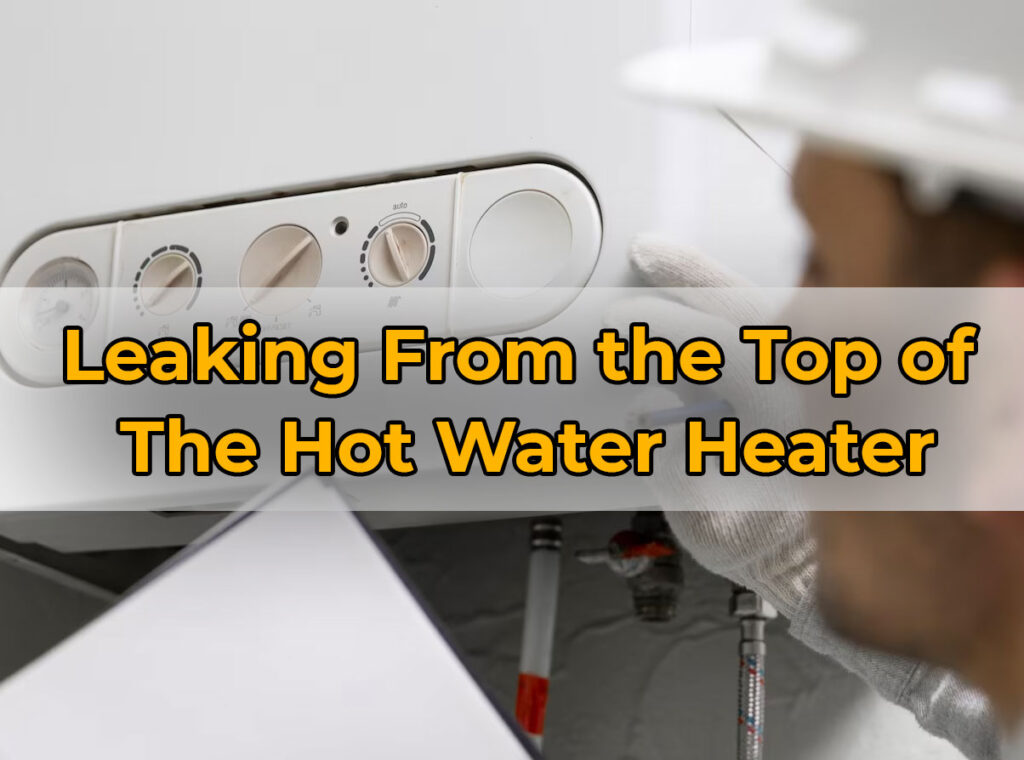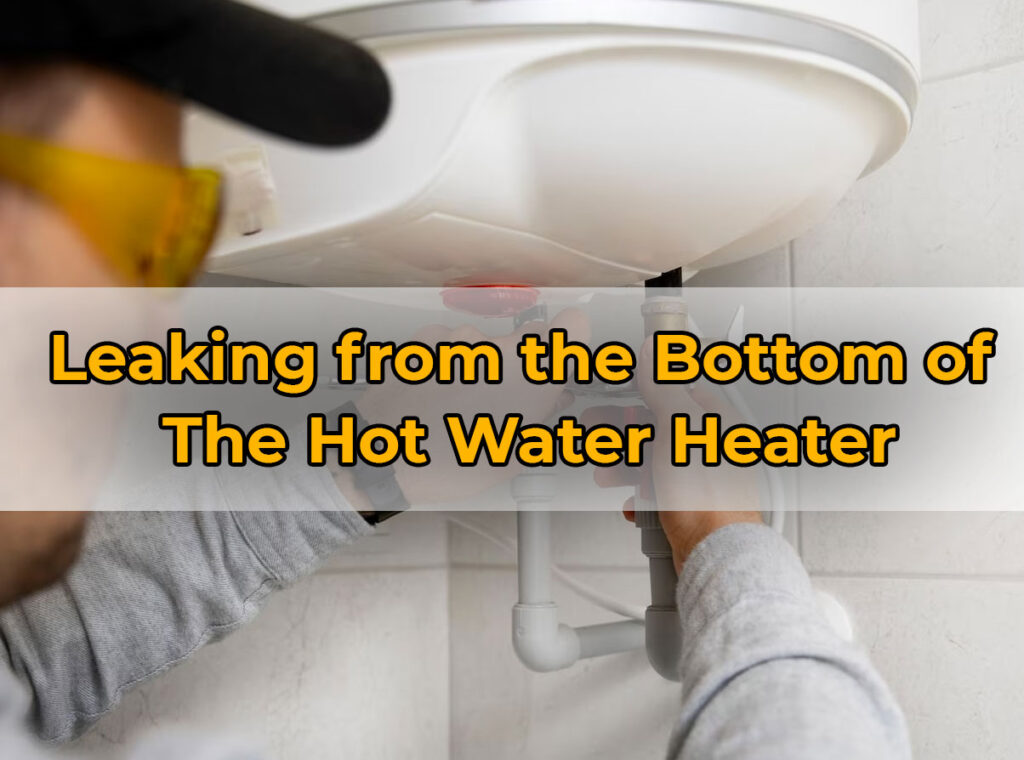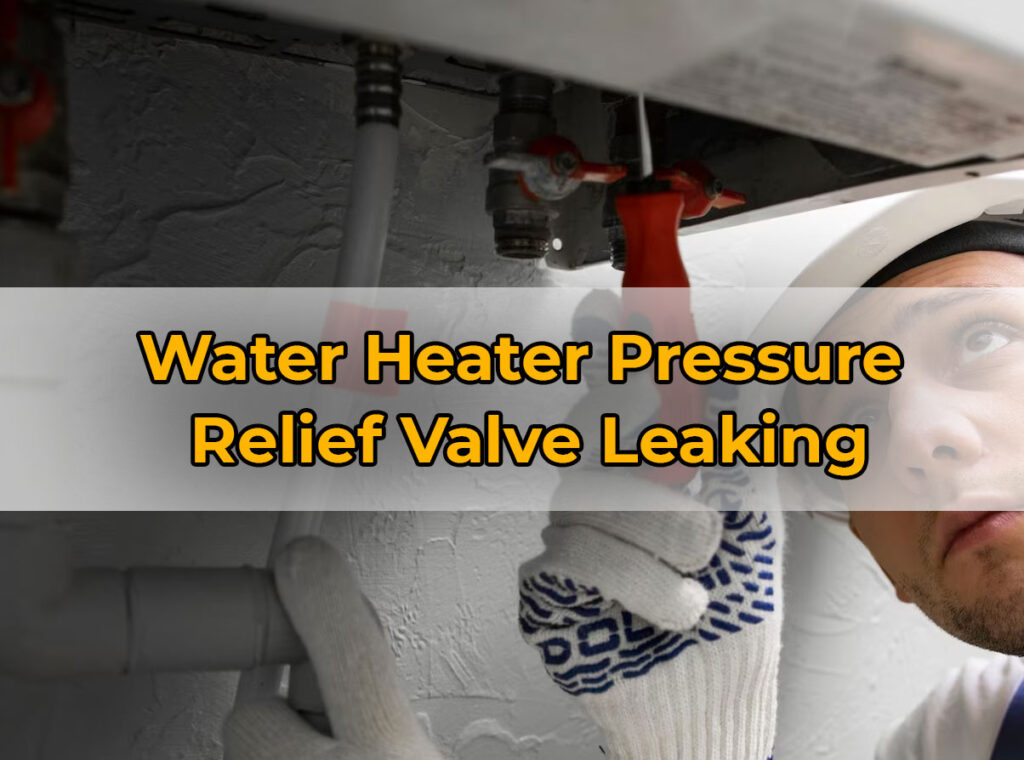Hot water heater leaking can be a major inconvenience for homeowners. A leaking hot water heater can cause damage to walls, floors, and other surrounding areas.
The situation can get worse if the leak is not quickly addressed. As a homeowner, you need to know what to do when you notice your hot water heater is leaking.
Knowing why it’s leaking and how to fix it will save you money, time and headaches. Here’s a guide on hot water heater leaking causes and solutions!
Leaking From the Top of The Hot Water Heater

To fix the problem of hot water heater leaking from the top, you need to understand its causes and take appropriate steps.
The sources of leakage can vary from common to uncommon. Furthermore, fixing it can be as simple as tightening a valve or complicated as replacing a component. In this section, we will introduce you to the causes of leaking from the top and the steps to fix it.
Causes of leaking from the top of The Hot Water Heater
When there’s leaking from the top of a hot water heater, it can be caused by several reasons. A faulty valve or loose connection is usually to blame. Here are more detailed explanation on
1. Temperature and Pressure Relief Valve (TPR Valve)
The Temperature and Pressure Relief Valve (TPR Valve) is a vital component of any hot water heater. It’s responsible for regulating the temperature and pressure inside the tank to ensure that it doesn’t become too high, which can cause serious damage or even explosion.
However, in some cases, this valve can fail, causing hot water heater leaking.
One common reason why TPR Valves malfunction is due to an excess buildup of sediment or mineral deposits inside the tank. This buildup causes corrosion and rust over time, leading to a weakened valve that cannot properly regulate pressure or temperature which can cause hot water pressure low but cold fine.
When this happens, the TPR Valve may release small amounts of steam or water as a safety measure to prevent overheating and potential explosion.
Another possible reason for TPR Valve failure is improper installation or maintenance. If installed incorrectly or not maintained regularly, the valve may become stuck in an open position or stop functioning altogether which is important to increase water pressure in shower.
2. Leaking Connections
Leaking connections are one of the main culprits behind hot water heater leaks. Over time, connections between pipes and valves can loosen, which can cause water to leak from the hot water heater. If left unattended, this can lead to serious damage to your home and costly repairs.
One of the most common causes of leaking connections is corrosion. Corrosion occurs naturally over time as minerals and other substances build up inside the pipes and valves.
This buildup can cause small cracks or holes in the metal, which allows water to seep out slowly over time. Other possible causes for leaking connections include faulty installation or manufacturing defects in the unit itself.
If you suspect that your hot water heater is leaking due to a connection issue, it’s important to address it as soon as possible.
3. Corroded Tank or Tank Weld
A corroded tank or faulty tank weld is one of the most common causes of hot water heater leaking. Over time, the interior of a hot water heater tank can corrode due to exposure to minerals and sediments in the water.
This corrosion can weaken the metal and eventually cause leaks. In addition, faulty welds on the sides or bottom of a tank can also lead to leaks.
It’s important to keep an eye out for signs of corrosion or weld issues on your hot water heater, such as rust or discoloration on the tank surface, and puddles around the base of your unit.
If you notice any of these signs, it’s crucial that you address them immediately by calling a licensed plumber. Ignoring these issues could lead to more severe damage down the line.
4. Condensation
When the temperature of the water in the tank is higher than that of the surrounding air, moisture from the air will condense on the outside of the tank. This can lead to rust and other forms of corrosion that weaken the metal and eventually cause leaks.
In addition to causing leaks, condensation can also reduce the efficiency of your hot water heater. The insulation around your tank may become wet and lose its ability to keep heat inside, leading to increased energy costs as your heater works harder to maintain a consistent temperature.
Furthermore, standing water around your hot water heater can create an ideal environment for mold growth if left untreated.
To prevent condensation from causing hot water heater leaking, it is essential to ensure proper ventilation and insulation for your unit.
Steps to fix leaking from the top
If your hot water heater is leaking from the top, it’s urgent to address the issue. Take these steps to troubleshoot and repair it:
- Spot the leak. Check the top of your hot water heater to locate where the leak is coming from.
- Check and tighten all connections. Make sure all fittings and connections are secure to avoid any leaks.
- Replace broken parts. Substitute any parts or components found to be damaged, to stop the leak.
Remember, a leak can be caused by other internal issues with your hot water heater. If these steps don’t fix the problem, contact a professional plumber.
Pro Tip: Maintain your hot water heater to stop unexpected leaks and extend its lifespan. Check also Water Heater Sounds Like a Tea Kettle!
Don’t fret if your hot water heater is leaking from the bottom – it’s just watering your plants!
Leaking from the Bottom of the Hot Water Heater

To fix leaking from the bottom of your hot water heater, there are a few simple steps you can take. First, identify the causes of leaking from the bottom, such as a faulty drain valve or corrosion of the tank. Then, follow the appropriate steps to fix the issue and prevent further damage.
Causes of leaking from the bottom
Hot water heaters can leak from the bottom. This could be due to corrosion, overheating, or high water pressure. Damage to the tank can lead to a hole at the bottom. It’s important to take care of this issue quickly.
1. Tank corrosion
Tank corrosion can happen when the steel tank is exposed to moisture or oxygen over an extended period. This exposure leads to rust formation on the inside of the tank, which weakens its structure and eventually causes it to leak from the bottom. Corrosion can also occur due to hard water deposits that accumulate in the tank over time and cause pitting in the metal surface.
Furthermore, high temperatures within the tank accelerate corrosion as well. When hot water sits stagnant for prolonged periods, it creates a perfect environment for bacteria growth that produces hydrogen sulfide gas.
2. Faulty drain valve
The drain valve is a small component located near the bottom of the hot water heater tank. Its purpose is to allow for easy draining and flushing of sediment buildup in the tank.
However, if this valve becomes damaged or malfunctions, it can cause leaks from the bottom of the tank. This can be due to either improper installation or wear and tear over time.
3. Loose or damaged fittings
Loose or damaged fittings occur when the connections between pipes and components become loose over time due to wear and tear. A fitting that is not tightly secured can lead to leaks around the base of the hot water heater. These leaks may start small but can quickly escalate into larger problems on your bathroom if left unaddressed for too long.
The first sign of a leaky hot water heater is usually a puddle forming around the base.
Steps to fix leaking from the bottom
Dealing with water leakage from the bottom of a hot water heater is critical and requires urgent attention. It can cause serious damage if not fixed fast. To repair the leak, follow these 6 steps:
- Turn off the power and water input valve
- Empty the tank
- Disconnect the water lines and electrical wiring
- Remove the faulty heating element or dismantle the old tank
- Attach the new unit securely
- Reattach wiring and refill the tank, check for any further leaks.
Inspect the surrounding surfaces, furniture and possessions below for any damage. Make sure to clean up any spilled water properly.
If unsure how to tackle this project, contact a skilled technician for help.
Hot water heaters have been around since the 1880s when Edwin Ruud first made them. Today, improved versions address many of the issues of older models. But proper maintenance is still essential for safety and a longer life.
Water Heater Pressure Relief Valve Leaking

To fix a pressure relief valve leaking from top or bottom of your hot water heater, follow the steps outlined in this section. Begin by understanding why the pressure relief valve may be leaking, then proceed to fix the issue. The sub-sections will guide you through the process step-by-step.
Why the pressure relief valve leaks
Pressure relief valve leaks can be a pain to deal with. Malfunctioning safety valves and pressure thresholds that are exceeded can cause excessive pressure buildup. This then leads to poor performance and, if not fixed, further damage.
Maintenance and installation practices can also cause valve leaks. Not doing regular checks, cleanings, and replacing parts can result in the valve wearing out sooner. Proper installation is key to preventing leaks as even small mistakes or gaps can create leakage opportunities.
Leaks can be avoided with simple steps. Tightening loose parts or replacing worn-out gaskets can keep leaks at bay. In more extreme cases, professional help may be needed.
The failure of a pressure relief valve caused a huge disaster when a chemical plant blew up due to overpressure. Numerous lives were lost and thousands of people’s health were affected for days afterwards.
You can prevent pressure relief valve leaks with minimal effort. Educate yourself on how to detect them and take the necessary steps. Doing this will give you one less thing to worry about.
Steps to fix the pressure relief valve
Leaky pressure relief valves can be a major problem. Act fast to avoid damage and accidents! Here’s how to handle it:
- Start off by turning off power and the water supply connected to the valve.
- Next, unscrew the valve from its fitting and remove it.
- Inspect closely for any cracks or damage. If none, then clean its inlet and outlet holes with a brush or cloth.
- Reattach it with thread sealant tape and turn on power and water supplies to test for any leaks.
Remember to stick to the protocol when handling the valve. Following these steps will help you fix it without professional help. Also, don’t make any adjustments until you’ve tested it thoroughly.
Lastly, make sure to maintain your plumbing system regularly. Get a certified plumber to conduct annual check-ups that include pressure relief valves. This will help reduce the occurrence of such issues.
Prevention of Hot Water Heater Leaks
To prevent hot water heater leaks with proper maintenance tips, it’s important to look for solutions that will keep your hot water heater in top working condition.
Hot water heater maintenance is key to avoiding leaks. Property owners can take several steps to stop them.
- Inspect the heater’s components and repair any leaks or damages right away.
- Check for leakage around valves, fittings, and pipes frequently.
- Change out worn-out parts quickly.
- Flush the heater tank often to get rid of sediment that can cause corrosion and leaks.
- Keep an eye on the temperature – it should not go over 120°F as overheating can cause a rupture.
- Fit an expansion tank on closed plumbing systems. These tanks prevent pressure changes which can lead to ruptures caused by thermal expansion.
- Hire a pro yearly to service your hot water heater. They will maintain and tune the heater while spotting potential problems that may result in leaks.
Also, don’t overload the hot water heater or use harsh chemicals like bleach or drain cleaners that damage the inside. With regular maintenance, you can lower the chance of costly leaks.
A homeowner didn’t fix his leaking faucet for a long time, resulting in major rusting and finally a major leak. He had to replace the whole system at a higher expense after disregarding simple repairs for too long.
Prevent a major flood in your home – get professional help before your hot water heater takes a plunge.
When to call a professional for help with hot water heater leaks
To determine when to call a professional for help with hot water heater leaks, focus on the signs. If you notice water leaking from the top or bottom of the heater, or the pressure relief valve leaking, it’s time to seek help. In this section, you’ll learn how to choose a qualified professional to fix the issue.
Signs you need professional help
Having trouble with your hot water heater? Get a pro! Here are some signs:
- Leaks around system
- Noises from device
- Inconsistent water temp
- Pressure problems in home
- Over 10 years old
If you’re feeling stressed or uncomfortable, hire a pro.
Recently, we helped a customer with discoloured water. We found a sludge build-up and cleaned it out. We also taught them to flush the system routinely.
So, get an expert who knows water heaters!
How to choose a qualified professional
When finding a skilled hot water heater repair technician, think about the qualifications and background they have. Look for a certified specialist with insurance and good reviews. Search online for top-rated experts or get suggestions from friends.
Pick someone who can provide a written quote and explains the issue in plain terms. Communication skills are crucial.
Ask if the technician provides warranties or guarantees. It’ll confirm that any trouble that appears after the fix will be taken care of without extra expenses.
In addition, ask for references. Contacting these customers directly will give you an idea of their experience.
Don’t let your water heater go cold, maintain and repair it to keep it hot.
Conclusion
Don’t ignore any leaking from the top or bottom of your hot water heater – it can cause significant damage. Inspect it regularly for corrosion and rust. Drain the tank once a year to avoid blockages and poor heating performance. If you live in a hard water area, use a water softener to reduce mineral buildup.
If leaks persist, get professional help immediately.
According to Consumer Reports Magazine (2021), 75% of US homeowners experience failure with their hot water heaters within 12 years due to no maintenance and late repairs. Make sure to maintain yours to prolong its lifespan and reduce repair needs.
Should I turn off water heater if leaking?
Yes!, you should turn off your water heater when you spot a leak!
Firstly, turning off the water heater can help prevent further damage to your home and appliances. If left unchecked, a leaky water tank can cause significant damage to your floors, walls and electrical systems.
However, if you do turn off your hot water supply completely, you will likely find yourself without any hot water at all for bathing or washing dishes until repairs have been made.
Secondly, it’s important to identify the source of the leak before making any decisions about shutting down the system.
What to do when hot water heater is leaking?
The first thing to do is to turn off the power supply or gas line connected to the heater. This will prevent further damage and ensure your safety.
Next, locate the source of the leak. Common areas include valves, fittings, and connections on top of or near the bottom of the tank. If it’s a minor leak from a valve or fitting, try tightening it with a wrench. However, if it’s a major leak from the tank itself, you’ll need to replace your hot water heater.
Before replacing your hot water heater, make sure to drain any remaining water in the tank by attaching a hose to the drain valve at the bottom and directing it into an appropriate drainage location such as outdoors or into a floor drain.
How long will a leaking water heater last?
The lifespan of a leaking water heater largely depends on its age and condition. If your water heater is relatively new and has only developed a minor leak, it may still function properly for some time. However, if your water heater is old or has multiple leaks in different areas, it may be time to replace it altogether. It’s important to keep in mind that ignoring a leaking water heater can lead to serious damage to your home and costly repairs in the long run.
I am a multi-talented designer and contractor with over 10 years of experience in the field. I have a passion for creating beautiful, innovative spaces that reflect my clients’ needs and styles. My skills include architectural design, interior design, space planning, project management and construction supervision.






